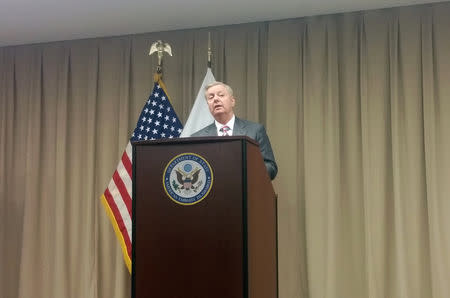U.S. Senator Graham urges Trump to meet Pakistan PM Khan
By James Mackenzie
ISLAMABAD (Reuters) - U.S. Republican Senator Lindsey Graham said on Sunday President Donald Trump should meet Pakistani Prime Minister Imran Khan as soon as possible to reset long-difficult U.S. relations with Pakistan and push for a peaceful settlement in Afghanistan.
The comments, which add to growing signs of improved relations between Islamabad and Washington, come amid efforts to press on with talks between the Taliban and the United States aimed at an agreement to end 17 years of war in Afghanistan.
"I've seen things change here and all in a positive direction," Graham, a member of the Senate Armed Services Committee who has generally been a staunch supporter of Trump, told a news conference in Islamabad.
He said a meeting with Khan, who has declared strong support for a peace agreement in Afghanistan, would leave Trump "far more enthusiastic about the region than he is today".
"With Prime Minister Khan we have a unique opportunity to change our relationship," he said. A previously transactional relationship, based on rewards for services rendered, should be replaced by "strategic engagement", including a free trade agreement, he said.
U.S. relations with Pakistan have long been dogged by suspicions that elements in the Pakistani establishment were aiding the Taliban, a charge Islamabad strongly denies. However, relations have appeared to improve in recent months amid efforts to push the Taliban towards a peace deal.
Trump, who has in the past argued for the United States to withdraw from Afghanistan, has made it clear he wants to see a peace accord reached rapidly although the Taliban have so far refused to talk directly with the Afghan government.
Graham's trip to Pakistan coincided with a visit by Zalmay Khalilzad, the U.S. special envoy for peace in Afghanistan, and top military commanders including General Joseph Votel, commander of U.S. Central Command.
Khalilzad left Islamabad without announcing a new date for talks with Taliban representatives, who have refused further meetings until the U.S. side agrees to discuss a timetable for withdrawing its forces.
The uncertainty has been increased by reports that Trump is prepared to order more than 5,000 U.S. troops out of Afghanistan, a move that would represent a sharp change in course from Washington's previous policy of stepping up military action against the Taliban.
With Afghan forces suffering thousands of casualties a year and struggling to hold back the Taliban insurgency, the reports have caused alarm in Kabul, prompting many close to the government to question the U.S. commitment to Afghanistan.
Asked whether there had been confusion over the U.S. message, Graham, who has called for a Senate hearing on Trump's plans to withdraw U.S. troops from Syria and Afghanistan, said "without a doubt" but added that he did not believe Washington would stand by and allow a Taliban victory.
"The world's not going to let the Taliban take Afghanistan over by force of arms. That would be unconscionable," he told Reuters. "Any president who let that happen would go down in history very poorly."
(Reporting by James Mackenzie; Editing by Dale Hudson)

 Yahoo News
Yahoo News 

